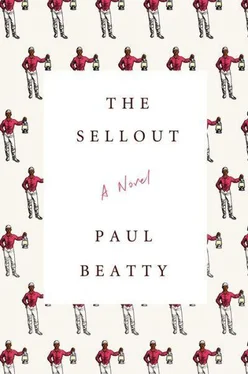Sadly, I never saw a three-dimensional mammary until the eve of my sixteenth birthday, when I woke up one night to find Tasha, one of my dad’s “teaching assistants,” sitting on the edge of my bed, naked, reeking of postcoital must and muscatel, and reading Nancy Chodorow aloud: “Mothers are women, of course, because a mother is a female parent … We can talk about a man ‘mothering’ a child, if he is this child’s primary nurturing figure, or is acting in a nurturant manner. But we would never talk about a woman ‘fathering’ a child.” To this day, whenever I’m lonely, I touch myself, thinking about Tasha’s titty and about how Freudian hermeneutics doesn’t apply to Dickens. A place where, often as not, it’s the child who raises the parents, where the Oedipus and Electra complexes are simple, sons, daughters, stepparents, or play-cousins, it doesn’t matter, since everybody’s fucking each other over and penis envy doesn’t exist because sometimes niggers just got too much dick.
* * *
I don’t know exactly why, but I felt like I owed Hominy something for all those afternoons Marpessa and I spent at his house. That there’s something about the craziness that he had to go through that’s kept me relatively sane. And one blustery Wednesday morning, about three years ago, during a well-earned afternoon nap, I heard Marpessa’s voice in my sleep. “Hominy” was all she said. After scrambling outside, I found a hastily written sign Scotch-taped to Hominy’s screen door fluttering in the breeze. I’z in de back , it read, his penmanship typical Little Rascal, squiggly, yet surprisingly legible. The back was Hominy’s memorabilia room. A small fifteen-by-fifteen add-on that was once crammed with a treasure trove of Our Gang props, headshots, and costumes. There weren’t many memories left. Most, like the suit of armor from which Spanky recited Mark Antony’s soliloquy in “Shivering Shakespeare” under a barrage of peashooters, the lock of Alfalfa’s personality, the top hat and tails Buckwheat wore when he conducted the Club Spanky Big Band and made “hundreds and thousands of dollars” in the “Our Gang Follies of 1938,” the long-ass hook-’n’-ladder scrap-metal fire engine used to win Jane back from the rich kid with the real fire engine, and the kazoos, flutes, and spoons that made up the wind and rhythm sections of the International Silver String Band had been long pawned and auctioned off.
As advertised, Hominy was indeed “in de back,” buck naked and hanging by his neck from a wooden beam. Two feet away from him sat a folding chair marked RESERVED, and on its seat a photocopy playbill for “Curtain Call,” a one-act of desperation. The noose was a bungee cord stretched to its bike rack limit, so much so that if he’d worn anything bigger than a size-eight shoe, his toes would’ve touched the ground. His face turning a deep shade of blue, I watched him twist in the draft. I had half a mind to let him die.
“Cut my penis off and stuff it into my mouth,” he rasped with what air was left in his lungs.
Apparently, asphyxiation makes your penis hard, and his brown member sprouted like a twig from a frizzy snowball of shock-white pubic hair. Like an antique whirligig, he kicked about frantically as much from his simultaneous attempt to burn himself in effigy as from the paucity of oxygen reaching his already-Alzheimered brain. Fuck the White Man’s Burden, Hominy Jenkins was my burden, and I knocked the can of kerosene and the lighter from his hand. Walked, not ran, back home to look for the gardening shears and some skin lotion. Taking my sweet time, because I knew that racist Negro Archetypes, like Bebe’s Kids, don’t die. They multiply. Because the kerosene splashed on my shirt smelled like Zima, but mostly because my father said he never panicked when someone from the neighborhood tried to hang themselves, because, “for the life of them, black people can’t tie knots for shit.”
I cut the self-lynching drama queen down. Lowered him gently to the rayon-carpeted floor and coddled his scraggly head. He filled my armpit with snot and tears as I rubbed cortisone into his rope-chafed neck and flipped through the playbill. On page two was a publicity shot of our boy chilling with the Marx Brothers on the set of the unreleased sequel to A Day at the Races , called A Day Among the Races . The Marx Brothers sit in backward-facing director’s chairs labeled GROUCHO, CHICO, HARPO, and ZEPPO. At the lineup’s far end is a high chair whose back reads DEPRESSO. In it, sitting cross-legged, is six-year-old Hominy, a thick white Groucho mustache painted on his upper lip. The photo is signed To Hominy Jenkins, the Shvartze Sheep of the Family. Best Wishes from the Marxes — Groucho, Karl, Skid, et al. Below this was Hominy’s bio. A sad listing of his meager screen credits that read like a suicide note:
Hominy Jenkins (Hominy Jenkins) — Hominy’s happy to make both his theatrical debut and his swan song at the Back Room Repertory Theater. In 1933 Hominy first put his wild, unkempt Afro to good use when he debuted as the wailing, abandoned Native Baby Boy in the original King Kong . He went on to survive that near Skull Island stomping and has since specialized in portraying black boys from the ages of eight to eighty, including most notably in Black Beauty —Stable Boy (uncredited), War of the Worlds —Paper Boy (uncredited), Captain Blood —Cabin Boy (uncredited), Charlie Chan Joins the Klan —Bus Boy (uncredited). Every film shot in Los Angeles between 1937 and 1964—Shoeshine Boy (uncredited). Other credits include various roles as Messenger Boy, Bell Boy, Bus Boy, Pin Boy, Pool Boy, House Boy, Box Boy, Copy Boy, Delivery Boy, Boy Toy (stag film), Errand Boy, and token Aerospace Engineer Boy in the Academy Award — winning film Apollo 13 . He wishes to thank his many fans who have supported him throughout the years. What a long, strange trip it’s been.
If that naked old man crying in my lap had been born elsewhere, say Edinburgh, maybe he’d be knighted by now. “Arise, Sir Hominy of Dickens. Sir Jig of Boo. Sir Bo of Zo.” If he were Japanese and had managed to survive the war, the economic bubble and Shonen Knife, then it’s quite possible he’d be one of those octogenarian Kabuki actors who, when he enters during the second act of Kyô Ningyô , the play comes to a reverential halt as the announcer introduces him to great fanfare and a government stipend. “Playing the role of Courtesan Oguruma, the Kyoto Doll, is Japanese Living National Treasure Hominy ‘Kokojin’ Jenkins VIII.” But he had the misfortune of being born in Dickens, California, and in America Hominy is no source of pride: he’s a Living National Embarrassment. A mark of shame on the African-American legacy, something to be eradicated, stricken from the racial record, like the hambone, Amos ’n’ Andy, Dave Chappelle’s meltdown, and people who say “Valentime’s Day.”
I placed my mouth to the waxy folds of Hominy’s ear.
“Why, Hominy?”
I couldn’t tell if he’d understood me. There was only that minstrel smile, pearly white, wide and servile, beaming blankly back at me. It’s crazy how, in a way, child actors never seem to age. There’s always one feature that refuses to grow old and marks them forever young, if not forgotten. Think Gary Coleman’s cheeks, Shirley Temple’s pug nose, Eddie Munster’s widow’s peak, Brooke Shields’s flat-chestedness, and Hominy Jenkins’s effervescent smile.
“Why, massa? Because when Dickens disappeared, I disappeared. I don’t get fan mail anymore. I haven’t had a visitor in ten years, ’cause don’t nobody know where to find me. I just want to feel relevant. Is that too much for an old coon to ask, massa? To feel relevant?”
Читать дальше












